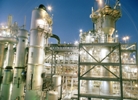
Bayer MaterialScience Upgrading Baytown Plant
Reliability upgrades, quality and environmental improvements are planned at the 40-year-old facility, the company's largest U.S. manufacturing site. Its employees achieved their best safety record ever in 2010.
Bayer MaterialScience LLC announced May 3 that it plans to invest some $120 million into its Baytown, Texas, plant, which is the company's largest U.S. manufacturing site. The plant's management and employees are celebrating 40 years of manufacturing success this year and achieved their best-ever safety record in 2010.
"Our Baytown plant is a critical asset in the Bayer MaterialScience global portfolio," said Dr. Tony Van Osselaer, a member of the company's Executive Committee and head of Industrial Operations. "It is a first-rate manufacturing facility, and these significant investments are our commitment to keeping it fit for the future."
The planned investment includes:
- Methylene diphenyl diisocyanate (MDI) environmental upgrades, reliability improvements, and minor debottlenecking.
- Toluene diisocyanate (TDI) improved process technology, environmental upgrades, and energy efficiency and reliability improvements to increase productivity.
- Polycarbonate reliability upgrades and quality improvements for advanced optical applications.
 "Reliability and safety are our priorities. A safe plant is a more reliable plant. In 2010, Bayer MaterialScience Baytown employees achieved their safest record in the 40-year history of the plant," said Rod Herrick, the Baytown facility's general plant manager. "These investments are a tribute to them as well as to the ongoing performance of the site." The company has about 14,400 employees at 30 production sites around the world.
"Reliability and safety are our priorities. A safe plant is a more reliable plant. In 2010, Bayer MaterialScience Baytown employees achieved their safest record in the 40-year history of the plant," said Rod Herrick, the Baytown facility's general plant manager. "These investments are a tribute to them as well as to the ongoing performance of the site." The company has about 14,400 employees at 30 production sites around the world.
MDI and TDI are chemicals used to produce polyurethanes used in flexible, rigid, and spray foams; coatings; adhesives; and sealants. Polycarbonate is used in automotive headlamp lenses, CDs and DVDs, medical devices, and shatter-resistant optical lenses.